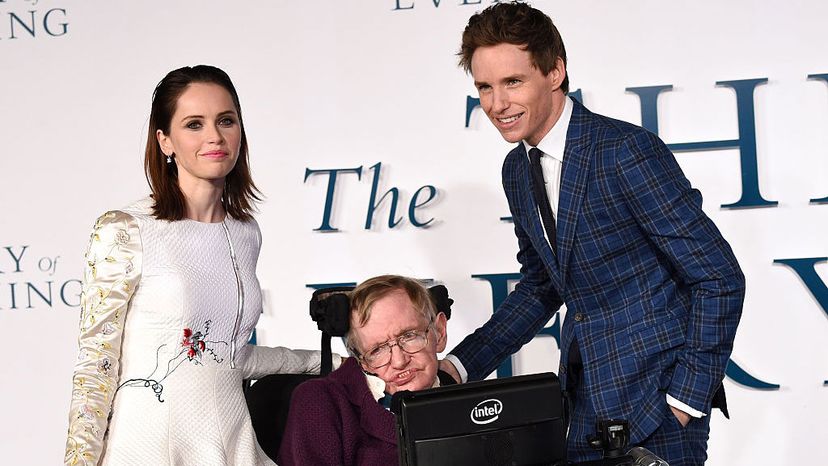Mind Over Body

After Hawking was diagnosed with amyotrophic lateral sclerosis (ALS) at 21 years of age, he was forced to balance the stresses of academic life with physical illness. The disease negatively affects brain and spinal neurons, making patients lose control of voluntary motor function and movement.
During the first few years, his condition worsened rapidly. Soon he relied on a wheelchair. By 1974, Hawking was unable to feed himself. Fortunately, the progression of the disease slowed a bit, eventually becoming more gradual over the years. With time, however, he still began losing the use of his voluntary muscles, hands and certain facial expressions.
Advertisement
Hawking previously used his finger to control a computer and voice synthesizer. But once he lost use of his hands, he started depending on twitching a cheek muscle to communicate. Most computers designed for him relied on running lists of words. Whenever the cursor reached a word or phrase he wished to use, Hawking twitched his cheek muscle to select it. Then he'd go on to the next word until he created a sentence. In the 1990s, by selecting words with his finger, he could pick 10 to 15 words per minute. But with the difficulty of twitching a cheek muscle, he could select just about one word per minute [source: Ferguson]. Because of this, most of Stephen Hawking's speeches and interviews were done in advance to save time.
Hawking died at age 76 at his home in Cambridge, leaving behind three children and three grandchildren. "He once said, 'It would not be much of a universe if it wasn't home to the people you love.' We will miss him forever," said his children in a joint statement released after his death in 2018. A 2014 movie about his life, "The Theory of Everything" won an Oscar for Eddie Redmayne who portrayed him.
For more information about Stephen Hawking and his work, check out the next page.
Stephen Hawking FAQ
How did Stephen Hawking talk?
Why is Stephen Hawking in a wheelchair?
What is Hawking's theory of everything?
Is there a movie on Stephen Hawking?
When and how did Stephen Hawking die?
Related Articles
More Great Links
Sources
- BBC News. "Hawking Takes Zero-Gravity Flight." April 27, 2007. (Jan. 20, 2012) http://news.bbc.co.uk/2/hi/6594821.stm
- Cartwright, John. "Information Paradox Simplified." PhysicsWorld.com. Aug. 15, 2011. (Jan. 26, 2012) http://physicsworld.com/cws/article/news/46848
- "Exploring Stephen Hawking's Unfettered Mind." NPR's Fresh Air. Jan. 3, 2012. (Jan 12, 2012) http://www.npr.org/2012/01/03/144312546/stephen-hawking-exploring-an-unfettered-mind
- Fahy, Declan. "Media Made Hawking Famous." Columbia Journalism Review. Jan. 11, 2012. (Jan. 12, 2012) http://www.cjr.org/the_observatory/media_made_hawking_famous.php?page=all
- Ferguson, Kitty. "Stephen Hawking: An Unfettered Mind." Palgrave MacMillian. New York City. 2012.
- Ferguson, Kitty. "How Stephen Hawking Works." Personal Interview. Jan. 17, 2012.
- Hogan, Jenny. "Hawking Concedes Black Hole Bet." New Scientist. July 21, 2004. (Jan. 20, 2012) http://www.newscientist.com/article/dn6193-hawking-concedes-black-hole-bet.html
- Huessner, Ki Mae. "Stephen Hawking on Religion: 'Science Will Win.'" ABC News. June 7, 2010. (Jan. 20, 2012) http://abcnews.go.com/WN/Technology/stephen-hawking-religion-science-win/story?id=10830164#.Txw8N6XOWHc
- Miller, Laura. "Stephen Hawking: An Unfettered Mind": Portrait of a Genius. Salon.com. Jan. 8, 2012. (Jan. 12, 2012) http://www.salon.com/2012/01/09/stephen_hawking_an_unfettered_mind_portrait_of_a_genius/singleton/
- Radford, Tim. "How God Propelled Stephen Hawking into the Bestsellers Lists." The Guardian. July 30, 2009. (Jan. 20, 2012) http://www.guardian.co.uk/science/2009/jul/30/stephen-hawking-brief-history-time
- Sample, Ian. "Stephen Hawking: There is No Heaven; It's a Fairy Story." The Guardian. May 15, 2011. (Jan. 20. 2012) http://www.guardian.co.uk/science/2011/may/15/stephen-hawking-interview-there-is-no-heaven
- Sample, Ian. "What Has Stephen Hawking Done for Science?" The Guardian. Jan. 8, 2012. (Jan. 12, 2012) http://www.guardian.co.uk/science/2012/jan/08/stephen-hawking-science-greatest-hits?intcmp=239
- Sapsted, David. "Hawking and Second Wife Agree to Divorce." The Telegraph. Oct. 20, 2006. (Jan. 12, 2012) http://www.telegraph.co.uk/news/uknews/1531891/Hawking-and-second-wife-agree-to-divorce.html
- Shiga, David. "Hawking Radiation Glimpsed in Artificial Black Hole." New Scientist. Sept. 28, 2010. (Jan. 26, 2011) http://www.newscientist.com/article/dn19508-hawking-radiation-glimpsed-in-artificial-black-hole.html
- StephenHawking.org.uk. "Brief Biography." (Jan. 12, 2012) http://www.hawking.org.uk/about-stephen.html
- The New York Times. "Stephen Hawking Denies Reports That He is a Victim of Abuse." Jan. 24, 2004. (Jan. 20, 2012) http://www.nytimes.com/2004/01/24/world/stephen-hawking-denies-reports-that-he-is-a-victim-of-abuse.html
- U.S. National Library of Medicine. "Amyotrophic Lateral Sclerosis." PubMed Health. Aug. 27, 2010. (Jan. 12, 2012) http://www.ncbi.nlm.nih.gov/pubmedhealth/PMH0001708/
- White, Michael & Gribbin, John. "Stephen Hawking: A Life in Science." Joseph Henry Press. Washington D.C. 2002.
Please copy/paste the following text to properly cite this HowStuffWorks.com article: